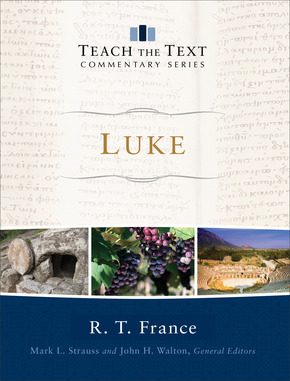Teach the Text Commentary Series
R. T. France
General Editors: Mark L. Strauss and John H. Walton
Grand Rapids: Baker Books
ISBN9780801092350, hbk, 416pp,
Publisher's website here.
This book is part of a new commentary series: Teaching the Text, a commentary series aimed primarily at pastors and teachers. The series is designed to provide a ready reference for teaching the biblical text. Each chapter of Luke, like others in the series, has a section in the commentary and each chapter is divided in to sections:
1. The Big Idea - as a sub heading
2. Key themes - in a side box
And then the main three sections:
3. Understanding the text
4. Teaching the text
5. Illustrating the text.
The text is in two columns and is well illustrated with colour photographs and images.
In the "Understanding the text" section each chapter is placed in its context, there is usually an outline of the text, and brief discussion of the historical and cultural background and finally, the main focus, interpretative and theological insights.
The "Teaching the text" section offers helpful ideas on applying the passage. "Illustrating the text" offers appropriate suggestion from resources such as poetry, other scriptures, films, news stories, books and object lessons. The layout makes it accessible and easy to use.
R. T. France (1933-2012) was an excellent choice to write this commentary. He has already produced a superb commentaries on Mark and Matthew. He was an astute and wise commentator letting the biblical evidence shape his views and approach. He takes the traditional view that Luke-Acts is one work composed, most likely, by Luke, a non-Jewish physician who had excellent Greek and was an associate of the apostle Paul. He sees this Gospel as being more than a "simply revised version of Mark". He thinks that dating Luke is problematic. Acts was written before the Neroian persecution ( AD 64-65), which suggests the Gospel written before that; however, Luke (in ch 19-21) seems to be familiar with the Roman siege in AD 70 and if Luke was reliant upon Mark and Mark was written in AD 60 then a later date may be possible. On balance France favours the earlier date.
Luke is a man with a message - the message of salvation. A message that was for all that were lost including the marginalised and disadvantages, even for the tax collector and Gentiles. France successfully brings out these themes. This is particularly evident in Luke 4:14-30, what France terms “Jesus’s manifesto”. Here the Big Idea is:
Back in Nazareth, Jesus sets out his mission of deliverance, but his own townspeople in Nazareth reject him because of his vision for salvation of fall people everywhere, which includes the Gentiles.France maintains that “the Nazareth sermon plays out in miniature the whole ministry of Jesus, including his proclamation of the gospel in the power of the spirit and his ultimate rejection by his own people.” He suggests that it would be helpful to go through the quoted Isaiah passage and “point out how each of the statements there find expression in Jesus’s later ministry”. To illustrate the text he provides vignettes of Martin Luther and Gandhi, anecdotes told by Leighton Ford and John Killinger regarding Mother Teresa and D. T. Niles respectively, as well as a quote from Extreme Righteousness by Tom Hovestol.
In many ways France’s description of Luke could also apply to France and this commentary: “his aim is to write reliable, accurate history, set out in an acceptable literary form, and he went to considerable pains to ensure that he was as well informed as he could be”. The literary form of this commentary and France’s reliability and considerable pains will certainly help preachers to be better informed before they go on to preach from Luke.


No comments:
Post a Comment